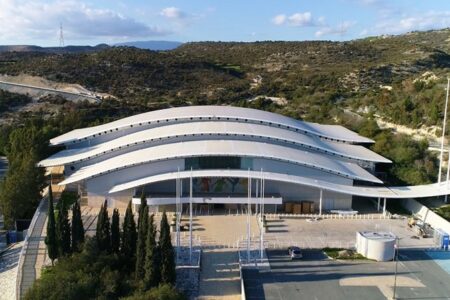21.03.2021
On Wednesday, the release of the program “Place in the Sun” was released. The audience witnessed the tears of joy of a woman who chose an apartment in Cyprus in order to come here on vacation.
This is a one bedroom apartment with a sea view. In addition, the site also has a swimming pool. The beach is nearby, the infrastructure is developed – in a word, everything that the heroine and her husband were looking for.
After some negotiations, the couple accepted the offer and bought an apartment.
But they did not realize what problems they might face in the future. As well as many other buyers.
Common expenses
Apartments and other shared-amenity housing estates with more than four units are required by law to have a Management Committee that manages all related affairs.
The owners of all apartments in these complexes must contribute to the cost of insurance, maintenance, repair, restoration and building management. These fees are known as utility bills.
At first glance, this is a very good idea, and it works well in other countries. Utility bills are used to maintain the functionality of common areas. For example, swimming pools, gardens and tennis courts. Through utility bills, the state of the objects is maintained, their appearance, value and suitability for sale are preserved.
However, the law does not work in Cyprus. Very often, problems arise due to the fact that the owners refuse to pay for utilities. This problem is likely to get worse due to the pandemic, as many people will lose their jobs or face a severe drop in their income.In cases where the owners refuse to pay, the Management Committee must make up the shortfall by increasing the payment to bona fide payers. This causes resentment and often leads to a domino effect as more owners refuse to pay. In the end, the Management Committee resigns en masse, and the buildings fall into disrepair and decay.
The only option available to the Governance Committee is to sue non-payers. This will cost around 1,500 euros in legal fees and court costs, another expense that needs to be covered by increased fees for conscientious payers. Under normal circumstances, it takes 2, 3 or 4 years to get a judgment against a defaulter.
The defaulter can claim to have no money and negotiate a long-term payment plan. This may delay the payment for another 2 or 3 years.
The court may also rule against the defaulter, allowing the Management Committee to file for a memorandum in respect of the property owned by the defaulter and in respect of the debt. (This assumes that the debtor has title to the property—unacceptable delays in the issuance of title deeds is another long-standing issue that has yet to be resolved.)
The memorandum prohibits the defaulter from selling, pledging and transferring property until the debt is repaid.
In these circumstances, the memorandum is of little use, as the debt will not be repaid in the foreseeable future.In addition, the memorandum remains in force only for six years from the date of registration of the judgment in the Land Registry. It can be renewed for two years over and over again subject to further court orders (and related costs).
The law must be changed to protect the Management Committee and the bona fide owner who continues to pay. Why should those who pay regularly have to pay for those who refuse?
Swimming pools in the apartments
Swimming pools in multi-apartment and other residential developments are considered “community pools” under Cypriot law and their operation is subject to strict laws and regulations governing their licensing and use. (The law dates from 1992 and has long since expired.)
This has significant legal and financial implications for the Management Committees and owners of these complexes.
Regardless of the size of the pool or the number of units in the complex, a lifeguard must be on hand when the pool is in use. Achieving this level of coverage would likely require two lifeguards, which would cost around €30,000 per year. Some larger complexes have two, sometimes three pools, each needing two lifeguards, and the cost would be astronomical. (In fact, there are not enough trained lifeguards in Cyprus to meet the demand).
To operate these pools, an annual operating license is required, which costs about 85 euros, and the equipment of the pool must be checked for compliance with safety requirements – another expense.
Anyone operating a pool without a license or acting against the rules, including the work of lifeguards, is guilty of a felony. The violator faces a fine of up to 450 euros, and if the offense continues after the conviction, he will face an additional fine of 50 euros for each subsequent day of improper operation of the pool.
In the past, the authorities turned a blind eye to this problem, resulting in many pools being operated without a license. But a couple of years ago, the Paphos authorities took drastic measures, the municipal health inspectors found more than 170 swimming pools operating without a license. Notices have been sent out to owners and tenants of these apartments stating that they are operating public pools without licenses.
The Management Committees had no choice but to close their pools or face the consequences.
Together with Denis O’Hara and Linda LeBlanc, we raised this issue at a meeting we had with the Home Office in 2007. In 2011 MEP Arlene McCarthy raised the issue at the European Commission. Although a new law was proposed in 2015, no progress has been made.
In 2008, European standards for swimming pools (EN 15288-1 and EN 15288-2) were introduced, which classify communal pools.For example, in residential complexes, depending on their size and use.
Complexes that have a communal pool for the use of property owners, their families and guests are classified as type 3 swimming pools. This makes them subject to different standards than a public pool and therefore do not require lifeguards, etc.
However, for well-known reasons, the Cypriot government did not implement these EU rules, which would instantly eliminate the need for lifeguards.
Hopefully the couple who starred in “A Place in the Sun” and bought a one-bedroom apartment will be able to avoid problems in the future. We wish them not to face inadequate and archaic laws and regulations governing utility bills and swimming pools.
















